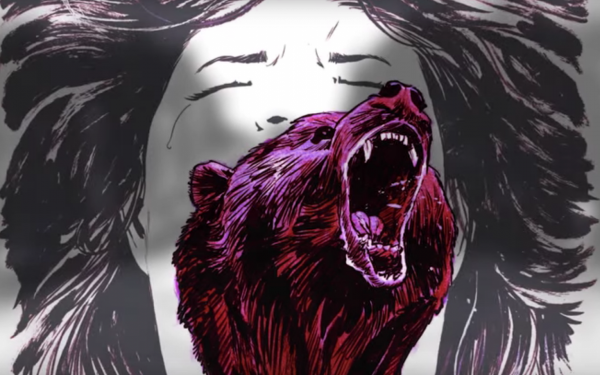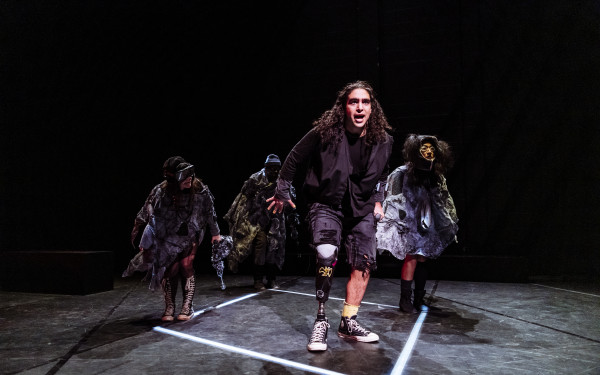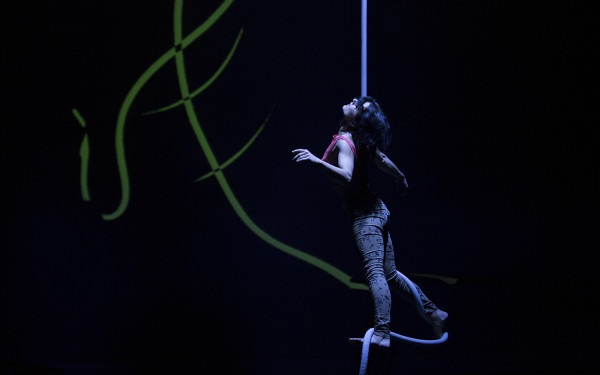Yukonstyle Puts Spotlight on Missing and Murdered Indigenous Women
Sarah Berthiaume’s 2013 Play Makes Its English-Language Debut in Montreal
A globally renowned play is making its first English appearance in Montreal, highlighting the persisting trauma of residential schools on Indigenous communities through the use of stereotypes.
Goldie, an Indigenous woman who became a sex worker in Vancouver’s downtown eastside after leaving a residential school in the 90’s, gets into a john’s pickup truck one night and follows him back home. There, she finds herself alone and sequestered in a shed reeking of pig with blood-splattered walls and purses on a table—and suddenly it clicks—her client has nefarious plans in mind.
Erupting with fear, Goldie cries out for a God who seems to have forgotten her, but in vain, for she has fallen prey to Robert Pickton.
Pickton is a pig-farmer who was convicted in 2007 for murdering six Indigenous women in Vancouver, and suspected of killing as many as 49. The unsettling scene is a flashback in playwright Sarah Berthiaume’s Yukonstyle, debuted in 2013, and now making its English-language premiere in Montreal at La Chapelle Theatre from Oct. 13 to 29.
Set in the vast emptiness of the -45°C Yukon, Berthiaume’s play begins as Goldie’s son, Garin, and his roommate Yuko, welcome into their home a 17-year-old Anglo-Canadian vagabond named Kate. And from the outset, there’s mayhem.
Garin bristles at Kate’s insensitivity as she brazenly mistakes Yuko, a Japanese head chef, for “an Indian, if only she had braids,” and she regurgitates to Garin’s face the stories she heard while riding the Greyhound bus about Indigenous communities ravaged by alcoholism.
Kate is young, white and ignorant. And while she may mimic the apathy of many, her oblivious bigotry along with her glow-in-the-dark, five-inch platform boots, feathered blue jacket and holed lace stockings—which Garin calls “hooker lace”—makes her seem overdone. And in that, she’s not alone.
Kate is surrounded by a cast of characters each assembled like Frankenstein’s monster, stitched together with as many tropes as possible. Garin is unreliable and always late, and relegated to washing dishes at the restaurant where Yuko is the almighty head chef—whose work is apparently artistry.
After the performance, Jasmine Chen, who played Yuko as well as Goldie, responded to an audience question of whether the play reinforced negative stereotypes. “It puts the ugliness on stage to show that these perceptions aren’t true,” she said.
“It puts the ugliness on stage to show that these perceptions aren’t true.”— Jasmine Chen, actor
Berthiaume’s Yukonstyle provokes audiences by giving them a glimpse of what the harrowing final moments of Pickton’s victims may have looked like through Garin’s narrative.
Garin was raised motherless by his alcoholic French-Canadian father, Pops. After badgering his father for the truth about his mother’s past when news about Pickton broke, Garin grows to suspect that she may have been one of his victims. Eventually, Pops is diagnosed with terminal cirrhosis of the liver, and on his deathbed he confirms to Garin that his mother, who renamed herself “Goldie” after fleeing residential school, was indeed a sex worker who had disappeared in Vancouver around the same time that serial-killer Pickton was active.
In her flashback, Goldie’s demise re-enacts on screen not just the final moments of Pickton’s victims, but possibly that of the many missing and murdered women whose cases remain unresolved today. As Goldie enters Pickton’s shed, darkness falls in the studio around her while she remains spotlit. The light grows dimmer as she learns her fate, and before succumbing to her captor, Goldie squeezes a purse to her chest, spilling blood.
Some members of the audience cried, as the fictional scene came close to reality.
Justin Many Fingers, an actor from Blackfoot First Nation in Alberta, played Garin. He has a more personal tie to the story—his grandmother was murdered, as he told the audience in a discussion after the performance. Many Fingers’ mother had also spent 35 years of her life believing her own mother had died from a brain tumor. By interweaving fiction with fact, that at times seemed more grisly than fantasy, Yukonstyle unsettled the audience—as perhaps it should have.
Pickton’s monstrosities expose the Canadian Justice System’s real failure to stop a serial killer from committing what police believe to be the largest killing spree in Canadian history. And while Pickton made headlines worldwide when he was arrested in 2002, today the torment continues.
The Globe and Mail reported in 2014 that Vancouver Police Chief Jim Chu apologized for his force’s failure—but yesterday RCMP Staff Sgt. Wayne Clary told CBC that police may never find the killers or make arrests related to British Columbia’s Highway of Tears, where countless Indigenous women were missing or murdered.
At its core, Berthiaume’s narrative serves as one story of how women who engage in sex work and high-risk activities can fall prey to murderous predators, but it’s not just those women at risk.
A 2014 RCMP report revealed there were 1,181 cases involving Indigenous women—1,017 of these women were murdered between 1980 and 2012. However, the Native Women’s Association
of Canada believes the number to be closer to 4,000.
Earlier this month, Indigenous people and non-Indigenous allies gathered in Montreal and called for justice at the 11th Memorial March for Missing and Murdered Indigenous Women. Many Fingers spoke at the march, calling on Prime Minister Justin Trudeau to give the support he had pledged. On Sept. 1, the Canadian federal government launched a national inquiry to investigate the country’s high rates of missing and murdered indigenous women.
“You have the most white privilege power in this country. You made us a promise that you would bring justice to my grandmother, to many grandmothers, to our sisters, daughters,” Many Fingers said at the Oct. 4 demonstration. “It’s time that you help us.”
With files from Emilee Guevara






